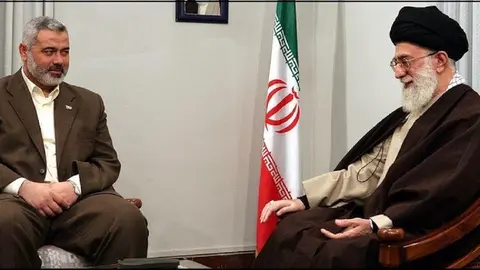Houthis and the threat in the Red Sea

The Houthi rebels, fighting in Yemen's war against the legally established government supported by the Saudi-led Arab anti-terrorist coalition, continue to generate instability in the Middle East.
This Shiite group linked to the Islamic Republic of Iran has been accused of hijacking an Israeli-linked ship, the Galaxy Leader, in the waters of the Red Sea while the ongoing war in Gaza between the Israeli army and the Palestinian armed group Hamas, unleashed after the bloody terrorist attack that the Palestinian organisation carried out on Israeli territory on 7 October, is taking place.
The conflict in Gaza has already left tens of thousands of people dead and hundreds kidnapped, and is a source of destabilisation in the region. Now, another element of discord are groups opposed to Israel and the West, such as the Houthi rebels, a Shiite group closely linked to Iran, the main standard-bearer of the Shiite branch of Islam, which has been singled out for hijacking a cargo ship linked to Israel on a crucial Red Sea shipping route and taking 25 crew members hostage. An action carried out in response to Israel's attack on Hamas in Gaza.

This episode generates further tension on a key Red Sea shipping route and adds further complication to the unstable situation in the Middle East. This is in addition to Iran's latest moves to threaten Israel, a historic enemy of the Ayatollahs' regime, with aggressive statements and acts such as the presentation of the latest Fattah II hypersonic missile and the latest generation of Iranian drones, christened precisely "Gaza".
The Houthi group also warned in this vein that it would continue to attack ships in international waters linked to or owned by Israelis until the end of Israel's campaign against Hamas' rulers in Gaza. "All ships that belong to or have dealings with the Israeli enemy will become legitimate targets," Houthi sources said.
Israeli Prime Minister Benjamin Netanyahu's office blamed the attack on the Galaxy Leader, a Bahamas-flagged car carrier affiliated with an Israeli billionaire, on the Houthis. He said the 25 crew members trapped were of various nationalities, including Bulgarian, Filipino, Mexican and Ukrainian, but that no Israelis were on board.

The Houthis claimed they were treating the crew members "in accordance with their Islamic values", but did not elaborate on what that meant, as reported by Euronews.
Netanyahu's office condemned the hijacking as an "act of Iranian terror". Meanwhile, the Israeli army described the action as a "very serious incident of global consequences".
Thus, the impact of Houthi militia terrorism has not stopped inside Yemen, but threatens shipping in the Red Sea, adding even more instability to the Middle East region, already badly shaken by the war between Israel and Hamas.
This latest detention of a ship linked to Israel has alerted the West to the need to change its strategy towards the Islamic Republic-backed group.
Analysts have pointed out that the Houthi rebels have recently been underestimated as a destabilising focus and a threat to Israel and, by extension, the West at a time of heightened tension in the Middle East, exacerbated by the war between Israel and Hamas.

The Houthis warned that Israeli ships are a "legitimate target". The Houthi-linked Al-Masirah channel quoted the deputy chief of staff, Major General Ali al-Mushki, as saying that "Israeli ships are legitimate targets for us anywhere", as reported by Al-Arab media.
The company that owned the ship said it had learned that the rebels boarded the ship by slipping a rope from a helicopter, a method used by Iran during previous operations to detain ships in the Strait of Hormuz. The Strait of Hormuz is a very important enclave for the transport of world oil and has long been threatened with obstruction by Iran after the Islamic Republic was hit by US sanctions following the break-up of the nuclear pact limiting the development of the Persian nuclear programme.
If Israel decides to cross into the Red Sea through the Bab al-Mandab Strait, which is encircled by Yemen, Djibouti and Eritrea, Yemen's Houthi rebels have said they will attack their ships. The Houthi movement's leader, Abdelmalik al-Huti, said in a televised speech on Tuesday. "We plan additional operations to hit Zionist targets in Palestine or elsewhere and we will not hesitate to do so in the Red Sea, particularly in the Bab al-Mandab and its waters adjacent to Yemeni territorial waters," he said.
As expert Matthew Hedges told Deutsche Welle, Houthi attacks and threats against Israel serve to call on Muslim communities to oppose Israel by aligning themselves with a "pan-Islamic narrative", whereby the Houthis lead the call for all Muslims to attack Israel. This is an identical message to that maintained by Hizbollah.
If the West continues to underestimate the Houthis' capabilities, they could expand the scope of their attacks, threatening regional stability, as several experts have noted, which will not help regional security.










